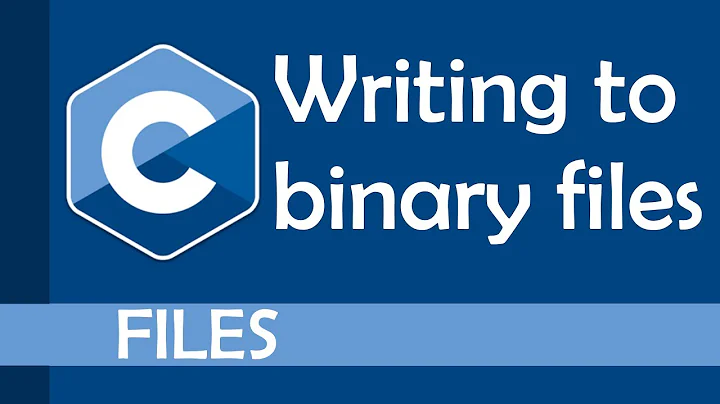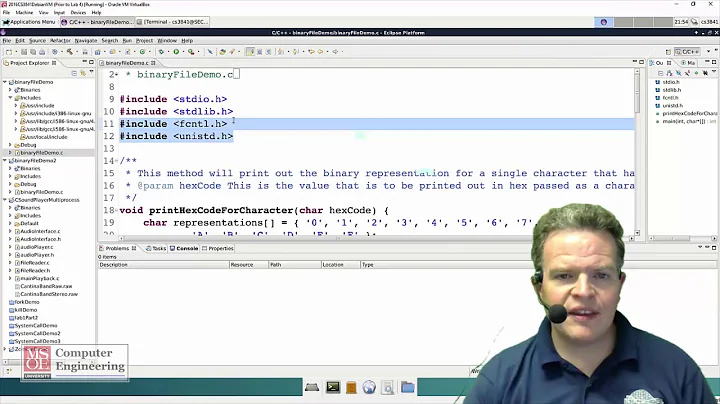How to dump a binary file as a C/C++ string literal?
Solution 1
You can almost do what you want with hexdump, but I can't figure out how to get quotes & single backslashes into the format string. So I do a little post-processing with sed. As a bonus, I've also indented each line by 4 spaces. :)
hexdump -e '16/1 "_x%02X" "\n"' filename | sed 's/_/\\/g; s/.*/ "&"/'
Edit
As Cengiz Can pointed out, the above command line doesn't cope well with short data lines. So here's a new improved version:
hexdump -e '16/1 "_x%02X" "\n"' filename | sed 's/_/\\/g; s/\\x //g; s/.*/ "&"/'
As Malvineous mentions in the comments, we also need to pass the -v verbose option to hexdump to prevent it from abbreviating long runs of identical bytes to *.
hexdump -v -e '16/1 "_x%02X" "\n"' filename | sed 's/_/\\/g; s/\\x //g; s/.*/ "&"/'
Solution 2
xxd has a mode for this. The -i/--include option will:
output in C include file style. A complete static array definition is written (named after the input file), unless xxd reads from stdin.
You can dump that into a file to be #included, and then just access foo like any other character array (or link it in). It also includes a declaration of the length of the array.
The output is wrapped to 80 bytes and looks essentially like what you might write by hand:
$ xxd --include foo
unsigned char foo[] = {
0x48, 0x65, 0x6c, 0x6c, 0x6f, 0x2c, 0x20, 0x77, 0x6f, 0x72, 0x6c, 0x64,
0x21, 0x0a, 0x0a, 0x59, 0x6f, 0x75, 0x27, 0x72, 0x65, 0x20, 0x76, 0x65,
0x72, 0x79, 0x20, 0x63, 0x75, 0x72, 0x69, 0x6f, 0x75, 0x73, 0x21, 0x20,
0x57, 0x65, 0x6c, 0x6c, 0x20, 0x64, 0x6f, 0x6e, 0x65, 0x2e, 0x0a
};
unsigned int foo_len = 47;
xxd is, somewhat oddly, part of the vim distribution, so you likely have it already. If not, that's where you get it — you can also build the tool on its own out of the vim source.
Solution 3
xxd is good but the result is highly verbose and takes a lot of storage space.
You can achieve practically the same thing using objcopy; e.g.
objcopy --input binary \
--output elf32-i386 \
--binary-architecture i386 foo foo.o
Then link foo.o to your program and simply use the following symbols:
00000550 D _binary_foo_end
00000550 A _binary_foo_size
00000000 D _binary_foo_start
This is not a string literal, but it's essentially the same thing as what a string literal turns into during compilation (consider that string literals do not in fact exist at run-time; indeed, none of the other answers actually give you a string literal even at compile-time) and can be accessed in largely the same way:
unsigned char* ptr = _binary_foo_start;
int i;
for (i = 0; i < _binary_foo_size; i++, ptr++)
putc(*ptr);
The downside is that you need to specify your target architecture to make the object file compatible, and this may not be trivial in your build system.
Solution 4
Should be exactly what you asked for:
hexdump -v -e '"\\" "x" 1/1 "%02X"' file.bin ; echo
Related videos on Youtube
Malvineous
Updated on September 18, 2022Comments
-
Malvineous almost 2 years
I have a binary file I would like to include in my C source code (temporarily, for testing purposes) so I would like to obtain the file contents as a C string, something like this:
\x01\x02\x03\x04Is this possible, perhaps by using the
odorhexdumputilities? While not necessary, if the string can wrap to the next line every 16 input bytes, and include double-quotes at the start and end of each line, that would be even nicer!I am aware that the string will have embedded nulls (
\x00) so I will need to specify the length of the string in the code, to prevent these bytes from terminating the string early. -
 PM 2Ring over 9 yearsNice! I didn't even know I had xxd. Now I just have to remember it exists next time I need it... or I'll probably just replicate the required functionality in Python. :)
PM 2Ring over 9 yearsNice! I didn't even know I had xxd. Now I just have to remember it exists next time I need it... or I'll probably just replicate the required functionality in Python. :) -
 Daniel Ignacio Fernández over 9 yearsThis produces redundant and invalid elements if input is shorter than 16 bytes.
Daniel Ignacio Fernández over 9 yearsThis produces redundant and invalid elements if input is shorter than 16 bytes. -
 PM 2Ring over 9 years@CengizCan: :oops:! Is that better?
PM 2Ring over 9 years@CengizCan: :oops:! Is that better? -
 Lightness Races in Orbit over 9 years@WanderNauta: You would access it in pretty much the same way as you'd access
Lightness Races in Orbit over 9 years@WanderNauta: You would access it in pretty much the same way as you'd accessfoo/foo_lenhere, and you wouldn't be vastly wasting storage space. I am convinced that the OP would be better off withobjcopyand that it suits his or her requirements. -
not2qubit over 9 yearsYour answer would be more useful if you also provided the input and output examples with it.
-
 PM 2Ring over 7 years@Malvineous Good point! I've amended my answer. Thanks for the heads-up (and thanks for accepting my answer).
PM 2Ring over 7 years@Malvineous Good point! I've amended my answer. Thanks for the heads-up (and thanks for accepting my answer). -
 eigenfield about 4 years
eigenfield about 4 yearsxxdis the best!







